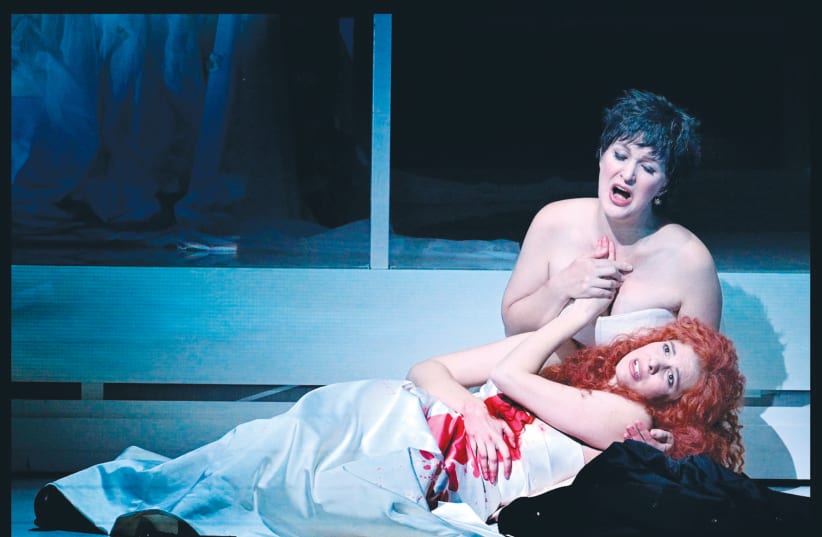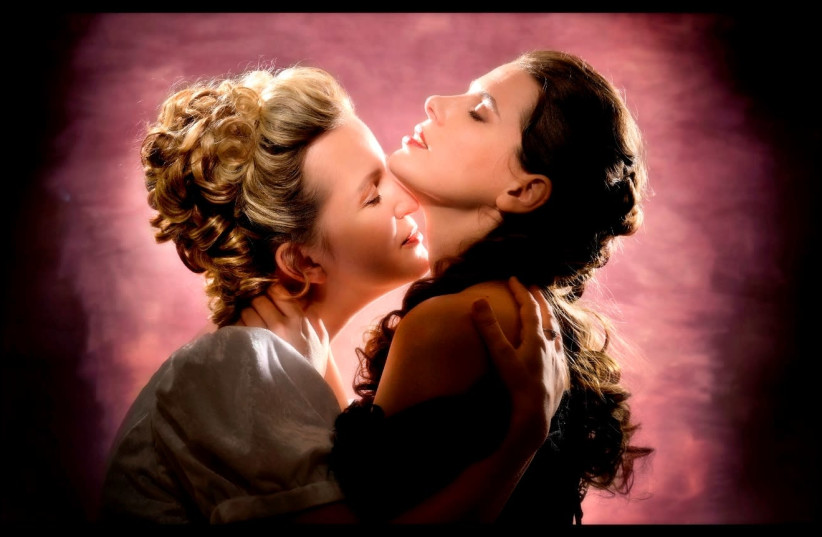A woman wearing a rainbow face mask at the performance of Vincenzo Bellini’s I Capuleti ed i Montecchi [a reworking of Romeo and Juliet], now at the Israeli Opera with female singers Tal Bergman and Alla Vasilevitsky playing the roles of Romeo and Giulietta, respectively, presents a nice illustration of the situation at hand.
By casting the star-crossed lovers in a new way, director Hanan Snir offers an LGBT adaptation of the Bellini opera which is both an identity-politics land mine and a wise reference to the “fatal loins of these two foes,” religion and humanism, which our current cultural moment sprang from.
From the land mine’s perspective, the opera cast women in these lead roles since it was first staged in 1830 with mezzo-soprano Giuditta Grisi as Romeo and soprano Maria Caradori-Allan as Giulietta. Female voices were used in an attempt to replace the castrati. Males who were castrated before puberty began to alter the alleged purity of their voices. Castrati like Farinelli and Alessandro Moreschi gave the audience, at their time, something uncanny – the sound of a child’s pure soul emitting from a male torso.
The Bel Canto, which is the style Bellini is most associated with, attempted to offer a similar sense of wonder with an outpouring of sound. This is why Grisi sang en travesti [wearing man’s clothes]. Bellini wanted his audience to marvel at such a terrific voice flooding them from what seemed to be a masculine character.
Snir toys with this idea by first presenting Romeo (Bergman, dressed as a man) to his enemies [the Capulets] boasting that he is “happy to present myself to you.” The irony, of course, is that Romeo does not, as the character still pretends to be a man. Romeo will reveal his true feminine nature only near the end of the opera. Believing Giulietta is dead, Romeo exposes “his” (actually female) chest to Tebaldo (Eitan Drori), begging Tebaldo to fire.
Giulietta’s father, Capellio (Noah Briger), does not know what Romeo looks like, and so is unable to avenge the death of his son. In this production, the son is killed by Romeo to protect Giulietta. The plotline has Giulietta’s brother discovering the love affair between the young lovers while both are in boarding school and, in rage, bent on killing his sister to restore honor.
When Romeo sings “Ascolta. Se Romeo t’uccise un figlio” [Listen: If Romeo killed your son] he offers Capellio a way out of the approaching bloodshed between the two factions. He could blame fate and adopt Romeo as a new son. In rage, Capellio refuses. He and his men swear war is coming, and blood will flow.
From the first moment the curtain is raised and we behold the set Roni Toren designed, we know what we are in for. The large stone-like relief in front of us depicts two warring factions. The decision to present the Capulets as a quasi-South-American military dictatorship and ergo very conservative is an excellent one.
Costume designer Polina Adamov gave the Montagues baseball caps and urban clothes to clash with the conservative suits and dark shades worn by the Capulets. Not only is this a brilliant visual decision, but kudos to movement designer Miri Lazar for the scene where the Montagues perform a Mafia-style takeover of the planned wedding by eliminating the Capulets’ waiters.
The Montagues are a visual cue to what is happening around us today. They could be wearing MAGA hats or yellow vests; one of them even wears a shirt with a peace sign. On the evening I attended, a political march could be seen and heard through the windows of the opera building, in an odd case of life imitating art.
PEOPLE WHO profess to dislike the opera often describe a parody of it. For example, a singer being shot in the chest, singing for 20 minutes, looking about, singing a bit more, and then dying. The trouble is that this parody is not baseless. This is exactly what happens when Romeo shoots himself in the chest, believing Giulietta is dead. Those who know a thing or two about the opera would marvel at Bergman’s performance and be deeply moved. The focus of this opera is not realism but the human voice, the emotions. Words and actions are secondary.
Those who are used to more lighthearted productions may fidget in their seats, wondering what is expected of them as an audience.
In that sense, this is an extremely well-made production that employs a variety of so-called tricks to keep the audience engaged. The LGBT gimmick (and kiss) is but one. Visual marvels like the cube that traps Giulietta, a fantastic representation of the social forces that confine her, are another.
One can only hope this will be enough to tempt new audiences to visit the opera and keep coming back for more.
I Capuleti ed i Montecchi, by Vincenzo Bellini, at the Israeli Opera, will be performed on August 16 (Monday) at 8 p.m.; August 18 (Wednesday), 8 p.m.; August 20 (Friday) at 1 p.m. and August 27 (Friday) at 1 p.m. Tickets range from NIS 445 to NIS 195. Sung in Italian with Hebrew and English supertitles. The performance is roughly two hours and twenty minutes long with an intermission.
For more info see https://www.israel-opera.co.il/eng/ or call (03) 692-7777. The Israeli Opera is at 19 King Saul Boulevard, Tel Aviv. Audience members will be requested to present a green badge and wear a face mask to attend the performance.

